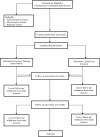The benefits of exercise training in interstitial lung disease: protocol for a multicentre randomised controlled trial
- PMID: 23369075
- PMCID: PMC3564686
- DOI: 10.1186/1471-2466-13-8
The benefits of exercise training in interstitial lung disease: protocol for a multicentre randomised controlled trial
Abstract
Background: Interstitial lung disease encompasses a diverse group of chronic lung conditions characterised by distressing dyspnoea, fatigue, reduced exercise tolerance and poor health-related quality of life. Exercise training is one of the few treatments to induce positive changes in exercise tolerance and symptoms, however there is marked variability in response. The aetiology and severity of interstitial lung disease may influence the response to treatment. The aims of this project are to establish the impact of exercise training across the range of disease severity and to identify whether there is an optimal time for patients with interstitial lung disease to receive exercise training.
Methods/design: One hundred and sixteen participants with interstitial lung disease recruited from three tertiary institutions will be randomised to either an exercise training group (supervised exercise training twice weekly for eight weeks) or a usual care group (weekly telephone support). The 6-minute walk distance, peripheral muscle strength, health-related quality of life, dyspnoea, anxiety and depression will be measured by a blinded assessor at baseline, immediately following the intervention and at six months following the intervention. The primary outcome will be change in 6-minute walk distance following the intervention, with planned subgroup analyses for participants with idiopathic pulmonary fibrosis, dust-related interstitial lung disease and connective-tissue related interstitial lung disease. The effects of disease severity on outcomes will be evaluated using important markers of disease severity and survival, such as forced vital capacity, carbon monoxide transfer factor and pulmonary hypertension.
Discussion: This trial will provide certainty regarding the role of exercise training in interstitial lung disease and will identify at what time point within the disease process this treatment is most effective. The results from this study will inform and optimise the clinical management of people with interstitial lung disease.
Trial registration: Australian New Zealand Clinical Trials Registry ACTRN12611000416998.
Figures
Similar articles
-
High intensity interval training versus moderate intensity continuous training for people with interstitial lung disease: protocol for a randomised controlled trial.BMC Pulm Med. 2021 Nov 10;21(1):361. doi: 10.1186/s12890-021-01704-2. BMC Pulm Med. 2021. PMID: 34758808 Free PMC article.
-
The evidence of benefits of exercise training in interstitial lung disease: a randomised controlled trial.Thorax. 2017 Jul;72(7):610-619. doi: 10.1136/thoraxjnl-2016-208638. Epub 2017 Feb 17. Thorax. 2017. PMID: 28213592 Clinical Trial.
-
A randomised controlled trial of supplemental oxygen versus medical air during exercise training in people with chronic obstructive pulmonary disease: supplemental oxygen in pulmonary rehabilitation trial (SuppORT) (Protocol).BMC Pulm Med. 2016 Feb 4;16:25. doi: 10.1186/s12890-016-0186-4. BMC Pulm Med. 2016. PMID: 26846438 Free PMC article. Clinical Trial.
-
Exercise training undertaken by people within 12 months of lung resection for non-small cell lung cancer.Cochrane Database Syst Rev. 2019 Jun 17;6(6):CD009955. doi: 10.1002/14651858.CD009955.pub3. Cochrane Database Syst Rev. 2019. PMID: 31204439 Free PMC article.
-
Exercise limitation in interstitial lung disease - mechanisms, significance and therapeutic options.Chron Respir Dis. 2010;7(2):101-11. doi: 10.1177/1479972309354689. Epub 2010 Jan 7. Chron Respir Dis. 2010. PMID: 20056733 Review.
Cited by
-
Exercise training to improve exercise capacity and quality of life in people with non-malignant dust-related respiratory diseases.Cochrane Database Syst Rev. 2015 Nov 5;2015(11):CD009385. doi: 10.1002/14651858.CD009385.pub2. Cochrane Database Syst Rev. 2015. PMID: 26544672 Free PMC article.
-
Exercise as a prescription for patients with various diseases.J Sport Health Sci. 2019 Sep;8(5):422-441. doi: 10.1016/j.jshs.2019.04.002. Epub 2019 Apr 18. J Sport Health Sci. 2019. PMID: 31534817 Free PMC article. Review.
-
A comparison trial of eight weeks versus twelve weeks of exercise program in interstitial lung diseases.Sarcoidosis Vasc Diffuse Lung Dis. 2018;35(4):299-307. doi: 10.36141/svdld.v35i4.6830. Epub 2020 Mar 9. Sarcoidosis Vasc Diffuse Lung Dis. 2018. PMID: 32476917 Free PMC article.
-
Advances in the Evaluation of Respiratory Pathophysiology during Exercise in Chronic Lung Diseases.Front Physiol. 2017 Feb 22;8:82. doi: 10.3389/fphys.2017.00082. eCollection 2017. Front Physiol. 2017. PMID: 28275353 Free PMC article. Review.
-
Walking for hypertension.Cochrane Database Syst Rev. 2021 Feb 24;2(2):CD008823. doi: 10.1002/14651858.CD008823.pub2. Cochrane Database Syst Rev. 2021. PMID: 33630309 Free PMC article.
References
-
- American Thoracic Society. American Thoracic Society/European Respiratory Society International Multidisciplinary Consensus Classification of the Idiopathic Interstitial Pneumonias. Am J Respir Crit Care Med. 2002;165:277–304. - PubMed
-
- Garvey C. Interstitial Lung Disease and Pulmonary Rehabilitation. J Cardiopulm Rehab Prevention. 2010;30:141–146. - PubMed
-
- Harris-Eze AO, Srihdar G, Clemens RE, Zintel TA, Gallagher CG, Marciniuk DD. Role of hypoxemia and pulmonary mechanics in exercise limitation in interstitial lung disease. Am J Respir Crit Care Med. 1996;154:994–1001. - PubMed
Publication types
MeSH terms
LinkOut - more resources
Full Text Sources
Other Literature Sources
Medical


